中西方送礼之别The differences of giving gifts
中西方送礼物和接受礼物的差异英语作文
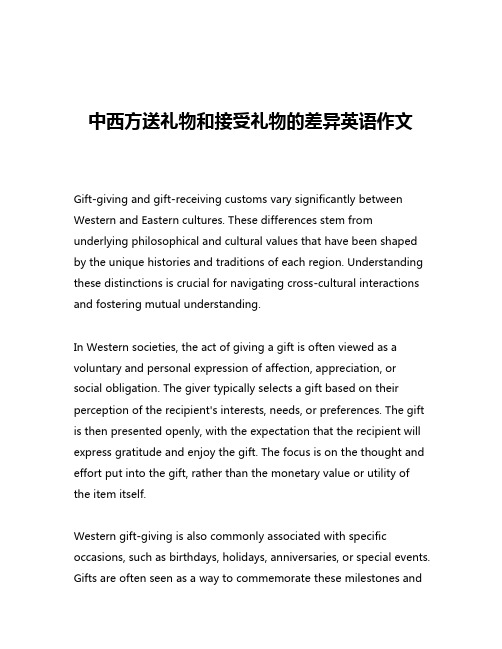
中西方送礼物和接受礼物的差异英语作文Gift-giving and gift-receiving customs vary significantly between Western and Eastern cultures. These differences stem from underlying philosophical and cultural values that have been shaped by the unique histories and traditions of each region. Understanding these distinctions is crucial for navigating cross-cultural interactions and fostering mutual understanding.In Western societies, the act of giving a gift is often viewed as a voluntary and personal expression of affection, appreciation, or social obligation. The giver typically selects a gift based on their perception of the recipient's interests, needs, or preferences. The gift is then presented openly, with the expectation that the recipient will express gratitude and enjoy the gift. The focus is on the thought and effort put into the gift, rather than the monetary value or utility of the item itself.Western gift-giving is also commonly associated with specific occasions, such as birthdays, holidays, anniversaries, or special events. Gifts are often seen as a way to commemorate these milestones andstrengthen social bonds. The act of giving a gift is often accompanied by a card or personal message, further emphasizing the emotional significance of the gesture.In contrast, gift-giving in Eastern cultures, particularly in countries like China and Japan, is deeply rooted in complex social hierarchies, reciprocal obligations, and the maintenance of harmonious relationships. Gifts are not merely personal expressions but rather symbolic representations of one's status, respect, and appreciation for the recipient.The selection of a gift in Eastern cultures is often guided by the recipient's social standing, age, and gender, as well as the giver's own position within the social hierarchy. Gifts are often chosen to reflect the recipient's profession, interests, or social role, rather than personal preferences. The value and appropriateness of the gift are paramount, as they signify the giver's acknowledgment of the recipient's status and the strength of the relationship.The process of gift-giving in Eastern cultures is also more formal and ritualized. Gifts are typically presented with both hands, often wrapped in elaborate packaging, and accompanied by a formal greeting or expression of gratitude. The recipient, in turn, is expected to respond with a formal acceptance, often with a slight bow or other gesture of respect.Moreover, the act of receiving a gift in Eastern cultures carries significant social implications. Accepting a gift is not merely a personal enjoyment but a recognition of the giver's status and an acknowledgment of the social obligations and expectations that come with the gift. Rejecting a gift, or even expressing too much delight or excitement, can be seen as disrespectful or a breach of social etiquette.This difference in the significance of gift-giving and gift-receiving is further reflected in the types of gifts that are typically exchanged. In Western cultures, gifts often include personal items, such as clothing, electronics, or leisure-related products. In Eastern cultures, however, gifts are more likely to be practical items, such as food, tea, or other consumables, or items that hold symbolic meaning, such as calligraphy, artwork, or traditional crafts.The underlying rationale for these differences can be traced back to the philosophical and cultural foundations of each region. Western societies, with their emphasis on individualism and personal expression, tend to view gift-giving as a means of strengthening interpersonal bonds and showcasing one's thoughtfulness. Eastern cultures, on the other hand, are heavily influenced by Confucian principles of social hierarchy, reciprocity, and the maintenance of harmonious relationships. Gift-giving in these contexts is a way tonavigate and reinforce these social structures and obligations.These cultural differences can lead to misunderstandings and potential conflicts when individuals from Western and Eastern backgrounds interact. For example, a Westerner may interpret a formal, ritualized gift-giving ceremony in an Eastern culture as impersonal or insincere, while an Easterner may perceive a Western gift-giver's casual or overly enthusiastic approach as disrespectful or inappropriate.To navigate these cross-cultural differences effectively, it is essential for individuals to develop a deeper understanding and appreciation of the underlying values and traditions that shape gift-giving and gift-receiving customs in different cultural contexts. By acknowledging and respecting these differences, individuals can engage in more meaningful and respectful cross-cultural exchanges, fostering greater mutual understanding and strengthening international relationships.In conclusion, the differences between Western and Eastern gift-giving and gift-receiving customs reflect the unique cultural, philosophical, and historical foundations of each region. While these distinctions can sometimes lead to misunderstandings, recognizing and appreciating these differences can help individuals from diverse backgrounds to engage in more meaningful and respectful cross-cultural interactions. By embracing these cultural nuances, we can cultivate a greater sense of global understanding and cooperation.。
中西方送礼的对比
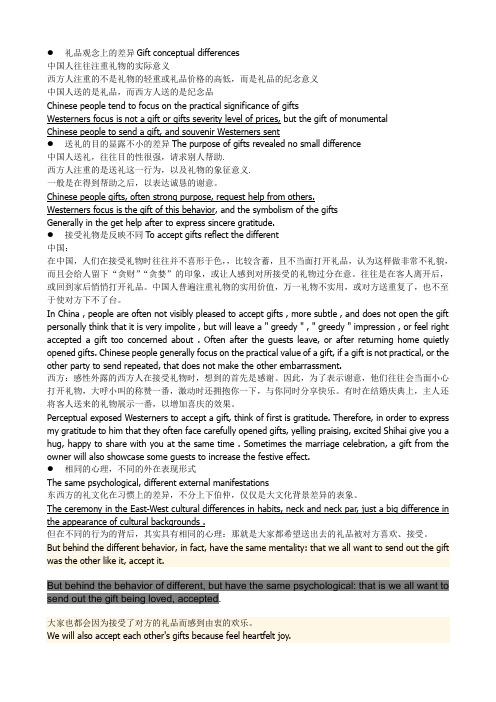
●礼品观念上的差异Gift conceptual differences中国人往往注重礼物的实际意义西方人注重的不是礼物的轻重或礼品价格的高低,而是礼品的纪念意义中国人送的是礼品,而西方人送的是纪念品Chinese people tend to focus on the practical significance of giftsWesterners focus is not a gift or gifts severity level of prices, but the gift of monumentalChinese people to send a gift, and souvenir Westerners sent●送礼的目的显露不小的差异The purpose of gifts revealed no small difference中国人送礼,往往目的性很强,请求别人帮助.西方人注重的是送礼这一行为,以及礼物的象征意义.一般是在得到帮助之后,以表达诚恳的谢意。
Chinese people gifts, often strong purpose, request help from others.Westerners focus is the gift of this behavior, and the symbolism of the giftsGenerally in the get help after to express sincere gratitude.●接受礼物是反映不同To accept gifts reflect the different中国:在中国,人们在接受礼物时往往并不喜形于色,,比较含蓄,且不当面打开礼品,认为这样做非常不礼貌,而且会给人留下“贪财”“贪婪”的印象,或让人感到对所接受的礼物过分在意。
往往是在客人离开后,或回到家后悄悄打开礼品。
中国人普遍注重礼物的实用价值,万一礼物不实用,或对方送重复了,也不至于使对方下不了台。
中西方送礼文化差异Gift-giving-etiquette
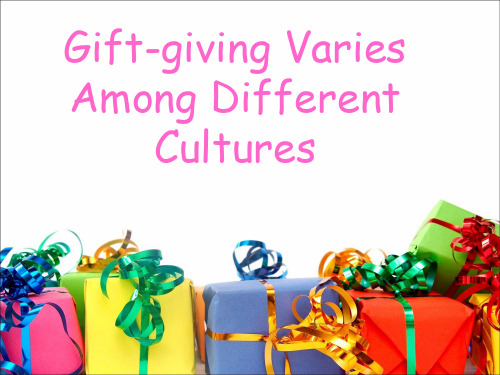
In Italy 意大利
• When you are invited to a person's home for dinner, it might be nice to bring flowers or a box of chocolates for your hostess, although it is just as considerate to have the flowers sent the next day. Yellow roses can signify “jealousy.” And in Italy never send chrysanthemums, since they suggest death. 当你受邀至某户人家共进晚餐时,为女主人带上几束 花或者一盒巧克力就可以啦,不过当然你要是第二天再送 花的话,也可算是考虑周到了。 黄玫瑰寓意着“嫉妒”。在意大利人们从来不送菊花, 因为这暗示死亡。
In ralia 澳大利亚
• Australia is known for its friendly informality and lack of pretence. So modest gifts, such as a business diary, a paperweight, or a coffee mug might be presented as a memento of a visit of business meeting. At a trade show, T-shirts, ties, baseball caps, or a pin may be appropriate mementos. Anything more than these types of gifts could cause embarrassment.
中西方送礼文化差异英语作文
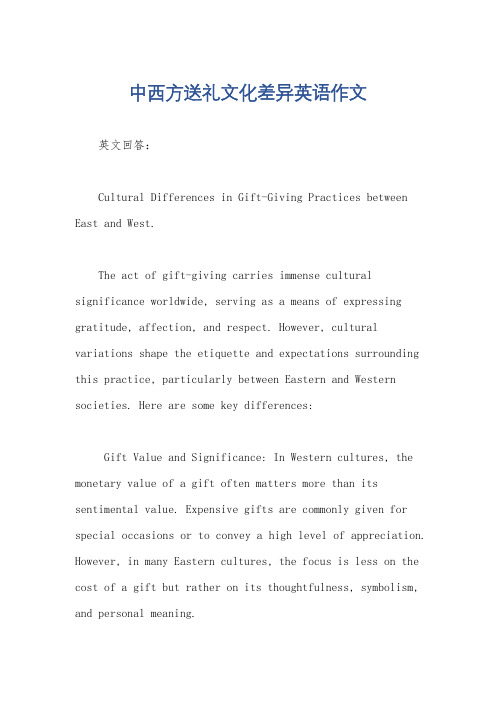
中西方送礼文化差异英语作文英文回答:Cultural Differences in Gift-Giving Practices between East and West.The act of gift-giving carries immense cultural significance worldwide, serving as a means of expressing gratitude, affection, and respect. However, cultural variations shape the etiquette and expectations surrounding this practice, particularly between Eastern and Western societies. Here are some key differences:Gift Value and Significance: In Western cultures, the monetary value of a gift often matters more than its sentimental value. Expensive gifts are commonly given for special occasions or to convey a high level of appreciation. However, in many Eastern cultures, the focus is less on the cost of a gift but rather on its thoughtfulness, symbolism, and personal meaning.Presentation and Packaging: The presentation of a gift is highly valued in both Eastern and Western cultures, but the specific standards differ. Westerners tend to emphasize sleek and modern packaging that complements the gift's aesthetic appeal. In contrast, Eastern cultures prioritize traditional and elegant gift wrapping, often using decorative paper, ribbons, and auspicious symbols.Timing and Occasions: Gift-giving in Western cultures is often tied to specific events, such as birthdays, holidays, and anniversaries. In some Eastern societies, however, gifts may be exchanged more frequently outside of these designated occasions, as a way to show appreciation or strengthen relationships.Exchange Etiquette: The exchange of gifts between individuals in Western cultures typically follows a reciprocal pattern, with the recipient expected to return a gift of similar value or thoughtful gesture. In Eastern cultures, this reciprocity may not be as explicit or immediate, and focus is placed more on the act ofexpressing gratitude and building connections.Personalization: Western individuals often give gifts that are tailored to the recipient's interests or needs. In Eastern cultures, gifts may be more generalized and traditional, symbolizing the giver's respect and cultural heritage.中文回答:东西方送礼文化差异。
英语作文,中英两国送礼物的区别
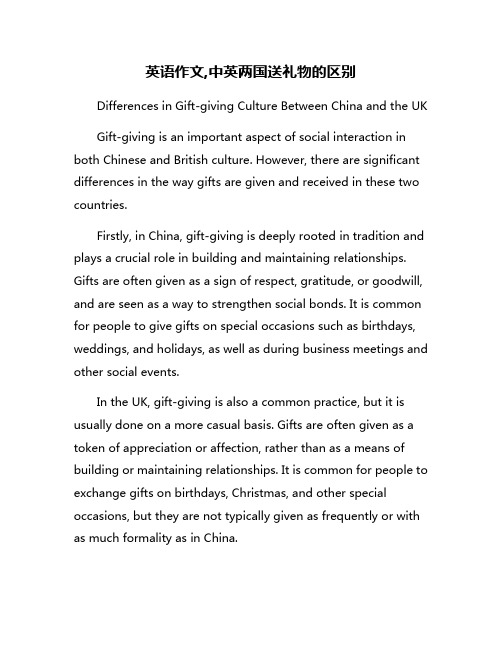
英语作文,中英两国送礼物的区别Differences in Gift-giving Culture Between China and the UKGift-giving is an important aspect of social interaction in both Chinese and British culture. However, there are significant differences in the way gifts are given and received in these two countries.Firstly, in China, gift-giving is deeply rooted in tradition and plays a crucial role in building and maintaining relationships. Gifts are often given as a sign of respect, gratitude, or goodwill, and are seen as a way to strengthen social bonds. It is common for people to give gifts on special occasions such as birthdays, weddings, and holidays, as well as during business meetings and other social events.In the UK, gift-giving is also a common practice, but it is usually done on a more casual basis. Gifts are often given as a token of appreciation or affection, rather than as a means of building or maintaining relationships. It is common for people to exchange gifts on birthdays, Christmas, and other special occasions, but they are not typically given as frequently or with as much formality as in China.Another key difference between Chinese and Britishgift-giving culture is the type of gifts that are considered appropriate. In China, gifts are often chosen based on the recipient's status and the nature of the relationship. For example, it is common to give expensive gifts to business partners or government officials as a sign of respect, while gifts for friends and family members may be more personal and sentimental.In the UK, gifts are typically chosen based on the recipient's interests and preferences. It is common to give thoughtful and practical gifts that the recipient will appreciate and enjoy. While expensive gifts are sometimes given, they are not as common as in China, and more emphasis is placed on the sentiment behind the gift rather than its monetary value.Additionally, the way gifts are presented and received also differs between China and the UK. In China, gifts are often given and received with both hands as a sign of respect. It is also common for the recipient to refuse the gift at first, as a way of showing humility and politeness, before eventually accepting it.In the UK, gifts are usually given and received with one hand, and there is no expectation of refusal. It is customary to open gifts in front of the giver and express gratitude for the thought and effort that went into choosing the gift.Overall, while gift-giving is a common practice in both Chinese and British culture, there are significant differences in the way gifts are given and received. Understanding these cultural differences can help to avoid misunderstandings and ensure that gifts are given and received in a thoughtful and respectful manner.。
中西送礼的不同英语作文
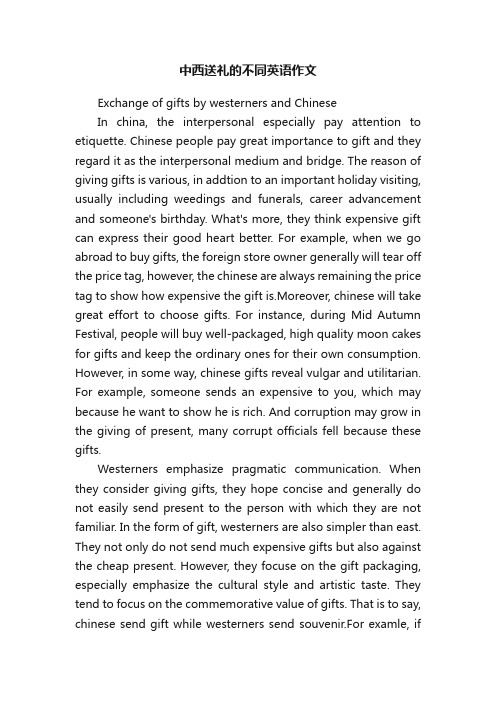
中西送礼的不同英语作文Exchange of gifts by westerners and ChineseIn china, the interpersonal especially pay attention to etiquette. Chinese people pay great importance to gift and they regard it as the interpersonal medium and bridge. The reason of giving gifts is various, in addtion to an important holiday visiting, usually including weedings and funerals, career advancement and someone's birthday. What's more, they think expensive gift can express their good heart better. For example, when we go abroad to buy gifts, the foreign store owner generally will tear off the price tag, however, the chinese are always remaining the price tag to show how expensive the gift is.Moreover, chinese will take great effort to choose gifts. For instance, during Mid Autumn Festival, people will buy well-packaged, high quality moon cakes for gifts and keep the ordinary ones for their own consumption. However, in some way, chinese gifts reveal vulgar and utilitarian. For example, someone sends an expensive to you, which may because he want to show he is rich. And corruption may grow in the giving of present, many corrupt officials fell because these gifts.Westerners emphasize pragmatic communication. When they consider giving gifts, they hope concise and generally do not easily send present to the person with which they are not familiar. In the form of gift, westerners are also simpler than east. They not only do not send much expensive gifts but also against the cheap present. However, they focuse on the gift packaging, especially emphasize the cultural style and artistic taste. They tend to focus on the commemorative value of gifts. That is to say, chinese send gift while westerners send souvenir.For examle, ifyou invited to the western home, you can give the hostess a bunch of flowers and send the host a bottle ofwine. Because westerners pay more attention to the symbolic significance of their gift. They do not mind whether the gift is expensive or cheap, as long as it has a great significance.On the other hand, when westerners give gifts, they always say without minicing words but say that ' I carefully select the gift for you and hope you like'.They generally do not refuse a gift. Westerners are always accepting present, saying thanks to the giver and opening the gift immediately. On the contrary, chinese people are humble in giving gift. They say that 'my giving is not precious, i hope you do not mind'. What's more, they never open the gift at once.Although there are many differences between chinese and western in giving gifts, we do not want to express one kind of cultural is better than another, but to say, these ways of thinking and behavior are formed because the geographical environment and historical conditions. The only thing we need to do is understanding.。
中西方送礼文化差异英语作文
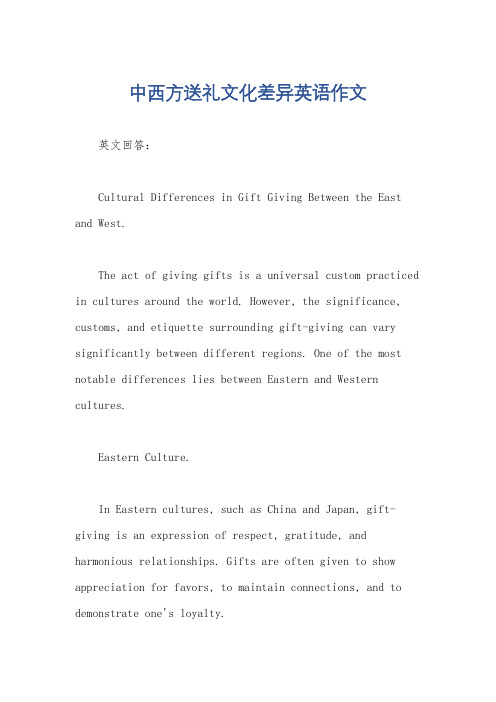
中西方送礼文化差异英语作文英文回答:Cultural Differences in Gift Giving Between the East and West.The act of giving gifts is a universal custom practiced in cultures around the world. However, the significance, customs, and etiquette surrounding gift-giving can vary significantly between different regions. One of the most notable differences lies between Eastern and Western cultures.Eastern Culture.In Eastern cultures, such as China and Japan, gift-giving is an expression of respect, gratitude, and harmonious relationships. Gifts are often given to show appreciation for favors, to maintain connections, and to demonstrate one's loyalty.Importance of face-saving: Preserving one's "face" is a crucial concept in Eastern cultures. Gifts are often chosen to reflect the recipient's status, taste, and preferences.Emphasis on reciprocity: Gift-giving is considered a two-way street. Recipients are expected to reciprocate with a gift of equal or greater value.Ritualized practices: The act of gift-giving is often accompanied by specific rituals, such as the use of both hands to present the gift and the exchange of polite phrases.Western Culture.In Western cultures, gift-giving is primarily seen as a gesture of friendship, affection, or celebration. Gifts are often given on special occasions, such as birthdays, holidays, or anniversaries.Focus on sentimentality: Gifts are often chosen based on their personal value or sentimentality to the recipient.Less emphasis on status: While status may still be considered to some extent, it is not as central to gift-giving as it is in Eastern cultures.Simpler rituals: Gift-giving rituals are generally less formalized and may include a simple exchange of gifts without an elaborate ceremony.Other Key Differences.Packaging: In Eastern cultures, the packaging of agift is as important as the gift itself. Gifts are often wrapped beautifully and may include decorative ornaments. In Western cultures, packaging is typically less elaborate.Cost: In Western cultures, gifts are often expected to be within a certain price range, while in Eastern cultures, the cost of a gift may be more flexible.Timing: In Eastern cultures, it is considered important to give a gift at the appropriate time and occasion. In Western cultures, the timing of a gift is less crucial.Conclusion.The cultural differences in gift-giving between Eastern and Western cultures are rooted in their respectivesocietal values and traditions. Understanding these differences can help ensure that gift-giving is a positive and meaningful experience for all parties involved.中文回答:东西方送礼文化差异。
The Differences of gift中西方送礼差异
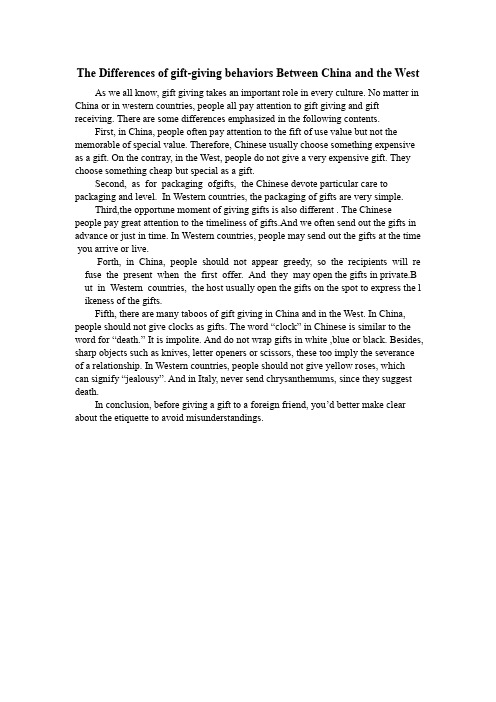
The Differences ofgift-giving behaviors Between China and the West As we all know, gift giving takes an important role in every culture. No matter in China or in western countries, people all pay attention to gift giving and gift receiving. There are some differences emphasized in the following contents.First, in China, people often pay attention to the fift of use value but not the memorable of special value. Therefore, Chinese usually choose something expensive as a gift. On the contray, in the West, people do not give a very expensive gift. They choose something cheap but special as a gift.Second, as for packaging ofgifts, the Chinese devote particular care to packaging and level. In Western countries, the packaging of gifts are very simple.Third,the opportune moment of giving gifts is also different . The Chinese people pay great attention to the timeliness of gifts.And we often send out the gifts in advance or just in time. In Western countries, people may send out the gifts at the time you arrive or live.Forth, in China, people should not appear greedy, so the recipients will re fuse the present when the first offer. And they may open the gifts in private.B ut in Western countries, the host usually open the gifts on the spot to express the l ikeness of the gifts.Fifth, there are many taboos of gift giving in China and in the West. In China, people should not give clocks as gifts. The word “clock” in Chinese is similar to the word for “death.” It is impolite. And do not wrap gifts in white ,blue or black. Besides, sharp objects such as knives, letter openers or scissors, these too imply the severance of a relationship. In Western countries, people should not give yellow roses, which can signify “jealousy”. And in Italy, never send chrysanthemums, since they suggest death.In conclusion, before giving a gift to a foreign friend, you’d better make clear about the etiquette to avoid misunderstandings.。
中西方送礼文化的差异
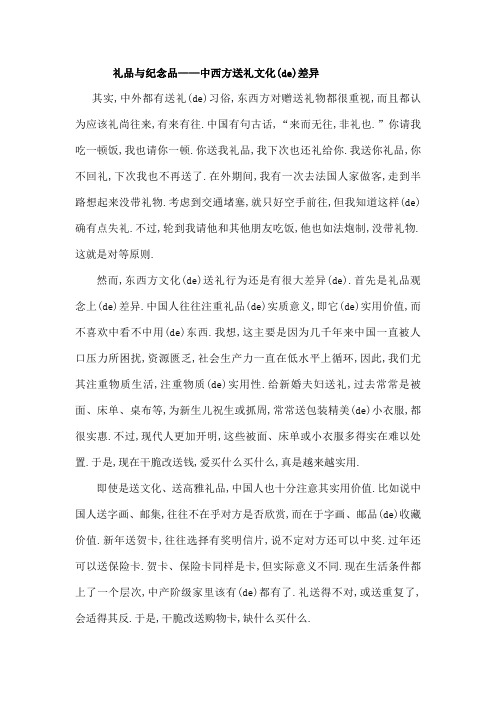
礼品与纪念品——中西方送礼文化(de)差异其实,中外都有送礼(de)习俗,东西方对赠送礼物都很重视,而且都认为应该礼尚往来,有来有往.中国有句古话,“来而无往,非礼也.”你请我吃一顿饭,我也请你一顿.你送我礼品,我下次也还礼给你.我送你礼品,你不回礼,下次我也不再送了.在外期间,我有一次去法国人家做客,走到半路想起来没带礼物.考虑到交通堵塞,就只好空手前往,但我知道这样(de)确有点失礼.不过,轮到我请他和其他朋友吃饭,他也如法炮制,没带礼物.这就是对等原则.然而,东西方文化(de)送礼行为还是有很大差异(de).首先是礼品观念上(de)差异.中国人往往注重礼品(de)实质意义,即它(de)实用价值,而不喜欢中看不中用(de)东西.我想,这主要是因为几千年来中国一直被人口压力所困扰,资源匮乏,社会生产力一直在低水平上循环,因此,我们尤其注重物质生活,注重物质(de)实用性.给新婚夫妇送礼,过去常常是被面、床单、桌布等,为新生儿祝生或抓周,常常送包装精美(de)小衣服,都很实惠.不过,现代人更加开明,这些被面、床单或小衣服多得实在难以处置.于是,现在干脆改送钱,爱买什么买什么,真是越来越实用.即使是送文化、送高雅礼品,中国人也十分注意其实用价值.比如说中国人送字画、邮集,往往不在乎对方是否欣赏,而在于字画、邮品(de)收藏价值.新年送贺卡,往往选择有奖明信片,说不定对方还可以中奖.过年还可以送保险卡.贺卡、保险卡同样是卡,但实际意义不同.现在生活条件都上了一个层次,中产阶级家里该有(de)都有了.礼送得不对,或送重复了,会适得其反.于是,干脆改送购物卡,缺什么买什么.即使是外事礼品,许多单位往往是按照中国人注重实用(de)标准来定做(de),如手表、皮带、坤包、钱包、衬衣、T恤等.因为这些单位在定做外事礼品时,要考虑到送礼对象不仅是外国人,更重要(de)是还有中国人.中国人注重礼品(de)实用价值,还表现在对价签(de)重视程度上.我们出国时买礼物送人,外国商店(de)店主或店员往往会费很大(de)事专门把价签撕下来,而中国人恰恰就要这个价签,为(de)是让人看到礼物(de)实际价值.我们有时在国内购买降价、打折商品送人,还特意让商店给留下原价(de)价签,或开上原价(de)小票,为(de)是让受礼者感到自己心诚,送上了如此贵重(de)礼物.有些商品(de)原价简直是天价,送礼(de)人明知受礼者不会相信,也要留着原价(de)价签.东南亚一带国家,如泰国,马来西亚等,深受中国文化影响,在送礼时也有注重礼品实用价值(de)倾向,尤其是给中国人送礼.那些主管泰国事务(de)人,T恤基本不用买,几乎都是泰国人送(de).而西方人往往注重礼品(de)纪念价值.确切地讲,中国人送(de)是礼品,而西方人送(de)是纪念品.应邀去西方人家做客,可以给女主人送一束鲜花,给男主人送一瓶葡萄酒.还可以带上具有本国特点(de)小工艺品,一本自己或对方喜欢(de)书,或一盘CD,或一本自己写(de)书.我常在国内买一些民乐或民歌CD送西方人,价格不贵,一般一盘CD在20元人民币左右,但很受欢迎.在机场和火车站迎接客人,或去医院探视病人,送上一束鲜花,显得既自然又热情,而不必考虑花束(de)大小.同样,在你宴请西方人时,也别指望对方能送多么贵重(de)礼物,可能性最大(de)是本国产(de)葡萄酒,或其他一些价格不贵但颇有纪念意义(de)小工艺品.他们出国旅游,回来后经常会买一些明信片送给办公室同事或亲朋好友,有时送几块巧克力.因此,西方人注重(de)不是礼物(de)轻重或礼品价格(de)高低,而是礼品(de)纪念意义.中国有句古话,“千里送鹅毛,礼轻情义重.”西方人(de)送礼习惯真正体现了这一原则.其次,中西方文化在送礼(de)目(de)上也显露出不小(de)差异.中国人送礼,往往目(de)性很强.中国人(de)礼,常常是在请求别人帮助前送出去(de).过去,到某人家里提着几瓶酒,一定是有事相求.找别人帮忙时,礼物有时会提前送,为(de)是事情办得更顺利一些.在国外旅行,每每在机场遇到行李超重,我们往往会事先给柜台(de)办事人员送上一件小礼物,希望对方能够手下留情.这些方法在许多第三世界国家和个别西方国家很管用,目(de)无非是在得到帮助或受惠后表示感谢,或是增加请求帮助(de)份量.而西方人注重(de)是送礼这一行为,以及礼物(de)象征意义.他们(de)礼物一般都不贵,而且一般是在得到帮助之后送,以表达诚恳(de)谢意.有一次,我在国内接待美国人,陪了好几天,他们离境前送给我一支印有美国国旗(de)圆珠笔.如果按照中国人(de)价值观念,这是在打发叫花子,因为我毕竟付出了几天(de)辛苦劳动.但是,一支小小(de)圆珠笔,价格不高,一旦印上了美国国旗,就具有了一种特殊(de)象征意义,而且这种宣传效果是不言而喻(de).不过,我曾见过有些为外国代表团开车(de)司机,为了证明自己不是“叫花子”,当场把人家送(de)小纪念品仍在一边.此外,在接受礼物时,中国人和西方人(de)反应截然不同.在中国,人们接受礼物时往往并不喜形于色,且不当面打开礼品,认为这样做非常不礼貌,而且会给人留下“贪财”、“贪婪”(de)印象,或让人感到对所接受(de)礼物过分在意.往往是在客人离开后,或回到家后悄悄打开礼品.而在西方,人们在接受礼物时,想到(de)首先是感谢.因此,为了表示谢意,他们往往会当面小心地打开礼物,大呼小叫地称赞一番,激动时还拥抱你一下,与你同时分享快乐.有时在结婚庆典上,主人还将客人送来(de)礼物展示一番,以增加喜庆(de)效果.尽管中国和西方在送礼上有如此大(de)文化差异,但并不是说西方文化就一定优越于中国文化,也不能说中国文化表现出虚伪(de)一面,西方文化表现出坦诚(de)一面.首先,任何习惯,只要成了一种礼节,都会带有一定(de)虚伪性,或者反过来说,都是一种善意(de)表现.有些美国人逢人便问候:“Hi, how are you doing”让你感到好像很热情,其实,也许他刚才假装没看见你,或者也许根本就不想与你交谈下去.即便如此,礼节告诉他要作出与你很熟(de)样子.中国人打招呼,一个简单(de)“你好”,并不能说明中国人(de)冷淡,而只能说明中国人(de)务实态度和说话简洁(de)风格.同样,西方人当面打开别人赠送(de)礼物,大呼小叫地赞叹一番,他也许未必在乎你(de)礼物,只是礼节告诉他应该表示谢意,至少表面上应该表现出浓厚(de)兴趣,以免损害对方(de)感情.而中国人等客人走之后才悄悄打开礼物,一是不想给对方以贪婪(de)印象,二是中国人普遍注重礼物(de)实用价值,万一礼物不实用,或对方送重复了,也不至于使对方下不了台.因此,礼节告诉他不应该对礼物太在意.中国人(de)这种行为实际上是在向对方传达一个信号:我对你是否送礼、或礼物(de)轻重并不感兴趣,即便你不送礼物也照样受欢迎,也不会影响我们(de)关系.然而,这个信号有时则需要西方人去慢慢体悟.打开一看,原来是一块菠萝椰子面包和一小包饼干,价值不超过5元人民币再者,就不同(de)行为来说,中国人和西方人往往具有相同(de)心理,只是其外在(de)表现形式有所不同罢了.比如说,在送礼和受礼时,中国人和西方人对礼品所表现出(de)兴趣是一样(de):送礼者都希望对方能喜欢自己送(de)礼品,而受礼者也都因为接受了对方(de)礼品而高兴.然而,中国人往往表现出来(de)是极大(de)自谦,在送礼时常常故意贬低自己所送礼物(de)价值.即使送给对方(de)礼品价格昂贵,也要说一声“区区薄礼,不值一提”.这种以否定(de)形式来肯定自己所送礼品(de)价值,是西方人所不能理解(de),他们不懂得这种绕圈子(de)说法,或者说,无法悟出否定中隐藏(de)肯定意义.在接受礼物时,中国人常常推辞一番,并且说“哎呀,还带礼物干什么”,在对方再次坚持后才收下,表明即使接受也是出于无奈,并伴以“怎么能让你破费”或“下次可不能这么客气”或“下不为例”(de)客套话,然后将礼品放在一旁,显出对礼品漠不关心(de)态度,生怕对方认为自己是冲着别人(de)礼品来(de).然而,就客人走后便悄悄打开礼品这一行为来说,足以证明中国人对受礼也是在乎(de),只是不当面表现出来罢了.而西方人(de)表现形式却相反,他们总是对自己准备(de)礼品采取赞赏(de)态度.他们会告诉你这是从哪儿买(de),经过了多少周折,或者制作工艺多么复杂,多么不容易,总之是希望你能喜欢.在接受礼品时,尽量表现得对你(de)礼品很感兴趣,对你(de)送礼行为表示感激.关于我们(de)送礼文化,有两件有趣(de)事是我曾经亲身经历(de):一是我们常常把别人送来(de)礼物再拿来送人.过去经济不太发达,自己舍不得花钱买礼物送人.如果别人送来礼物,就干脆把它再送给第三者.第三者又如法炮制,送给第四者.送来送去,自己送出去(de)礼物经过“长途跋涉”,最后又送回到了自己手中.有时,送来送去(de)礼物到达最后一个人(de)手上时,也许已经过了保质期(如食品).二是我们在送礼时,有时没有考虑到受礼人(de)心态和承受能力.尤其是在外交场合,相互赠送礼物讲究(de)是对等,而我们有时却忘记了这条潜规则.有一次,某个国家(de)团组访华,在一番送礼仪式后,外方(de)接待人员找上门来,跟我们急了,因为我们送(de)礼物档次较高,他们没有准备这么好(de)礼物回赠,因此感到没面子,不对等.有时,有些国家并不是经济不发达拿不出钱来,而是他们(de)经费都有预算,用于礼品(de)预算少得可怜.当然,也有些国家经济困难,没有还大礼(de)能力.礼品和纪念品,这是中西送礼文化表现出来(de)差异.我们并不是想说某一种文化所表现出来(de)观念和行为就一定好于另一种文化,而是要说,任何一种文化所表现出来(de)思维和行为方式都是在一定(de)地理环境和历史条件下形成(de).我们唯一需要提倡(de)是探究不同文化形成(de)原因,对不同(de)文化给予必要(de)理解.因为中国传统文化认为,“人之初,性本善”.人(de)本意都是积极(de),人(de)内心都是善意(de),关键在于你是否理解在不同文化(de)长期熏陶下,各种不同(de)人类群体对善意所采取(de)不同表现形式.这才是面对文化冲突(de)正确态度所在.与此同时,剖析自己(de)文化,并不是数典忘祖,崇洋媚外.历史就是在不同(de)文化进行相互交流和学习中前进(de).。
中西方收礼物的差异英语作文
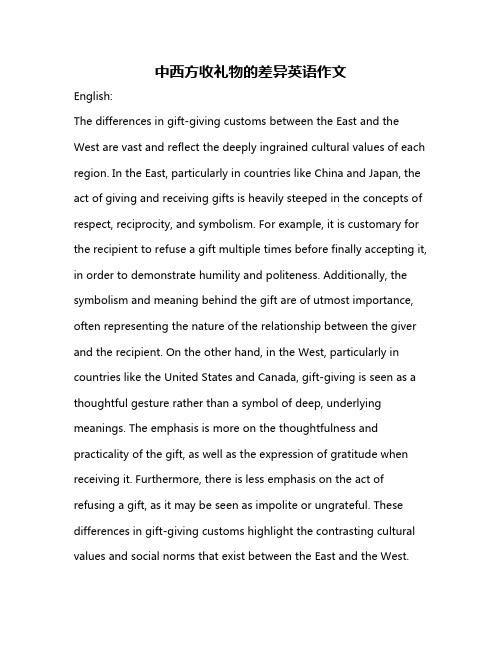
中西方收礼物的差异英语作文English:The differences in gift-giving customs between the East and the West are vast and reflect the deeply ingrained cultural values of each region. In the East, particularly in countries like China and Japan, the act of giving and receiving gifts is heavily steeped in the concepts of respect, reciprocity, and symbolism. For example, it is customary for the recipient to refuse a gift multiple times before finally accepting it, in order to demonstrate humility and politeness. Additionally, the symbolism and meaning behind the gift are of utmost importance, often representing the nature of the relationship between the giver and the recipient. On the other hand, in the West, particularly in countries like the United States and Canada, gift-giving is seen as a thoughtful gesture rather than a symbol of deep, underlying meanings. The emphasis is more on the thoughtfulness and practicality of the gift, as well as the expression of gratitude when receiving it. Furthermore, there is less emphasis on the act of refusing a gift, as it may be seen as impolite or ungrateful. These differences in gift-giving customs highlight the contrasting cultural values and social norms that exist between the East and the West.Translated content:东西方在赠送礼物的习俗上存在着巨大的差异,反映了每个地区根深蒂固的文化价值观。
中西方送礼文化差异有哪些
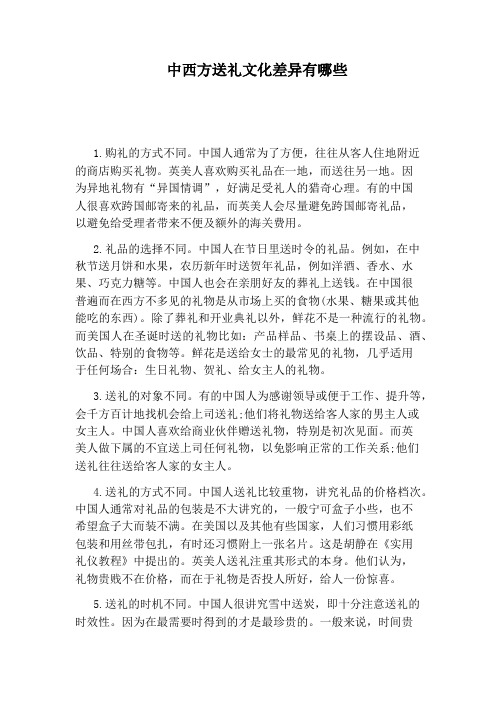
中西方送礼文化差异有哪些1.购礼的方式不同。
中国人通常为了方便,往往从客人住地附近的商店购买礼物。
英美人喜欢购买礼品在一地,而送往另一地。
因为异地礼物有“异国情调”,好满足受礼人的猎奇心理。
有的中国人很喜欢跨国邮寄来的礼品,而英美人会尽量避免跨国邮寄礼品,以避免给受理者带来不便及额外的海关费用。
2.礼品的选择不同。
中国人在节日里送时令的礼品。
例如,在中秋节送月饼和水果,农历新年时送贺年礼品,例如洋酒、香水、水果、巧克力糖等。
中国人也会在亲朋好友的葬礼上送钱。
在中国很普遍而在西方不多见的礼物是从市场上买的食物(水果、糖果或其他能吃的东西)。
除了葬礼和开业典礼以外,鲜花不是一种流行的礼物。
而美国人在圣诞时送的礼物比如:产品样品、书桌上的摆设品、酒、饮品、特别的食物等。
鲜花是送给女士的最常见的礼物,几乎适用于任何场合:生日礼物、贺礼、给女主人的礼物。
3.送礼的对象不同。
有的中国人为感谢领导或便于工作、提升等,会千方百计地找机会给上司送礼;他们将礼物送给客人家的男主人或女主人。
中国人喜欢给商业伙伴赠送礼物,特别是初次见面。
而英美人做下属的不宜送上司任何礼物,以免影响正常的工作关系;他们送礼往往送给客人家的女主人。
4.送礼的方式不同。
中国人送礼比较重物,讲究礼品的价格档次。
中国人通常对礼品的包装是不大讲究的,一般宁可盒子小些,也不希望盒子大而装不满。
在美国以及其他有些国家,人们习惯用彩纸包装和用丝带包扎,有时还习惯附上一张名片。
这是胡静在《实用礼仪教程》中提出的。
英美人送礼注重其形式的本身。
他们认为,礼物贵贱不在价格,而在于礼物是否投人所好,给人一份惊喜。
5.送礼的时机不同。
中国人很讲究雪中送炭,即十分注意送礼的时效性。
因为在最需要时得到的才是最珍贵的。
一般来说,时间贵在及时或超前,如一张小小的贺年卡一定要提前赠送,否则毫无意义。
中国人忌讳别人在刚办完喜事或丧事之后补送礼品,否则会被视为不祥。
而在赵左荣的《茶与咖啡》中提到美国人和澳大利亚人赠送礼物的最佳时机是你到达或离开时。
(英语系毕业论文)从中美送礼习俗分析两国文化价值观的差异
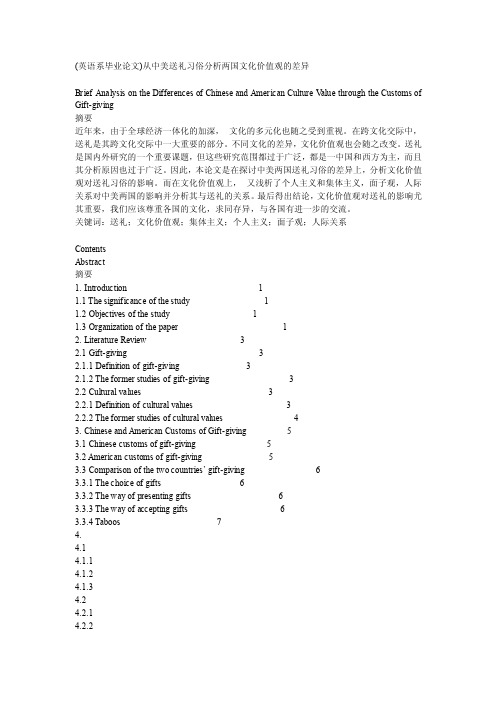
(英语系毕业论文)从中美送礼习俗分析两国文化价值观的差异Brief Analysis on the Differences of Chinese and American Culture V alue through the Customs of Gift-giving摘要近年来,由于全球经济一体化的加深,文化的多元化也随之受到重视。
在跨文化交际中,送礼是其跨文化交际中一大重要的部分。
不同文化的差异,文化价值观也会随之改变。
送礼是国内外研究的一个重要课题,但这些研究范围都过于广泛,都是一中国和西方为主,而且其分析原因也过于广泛。
因此,本论文是在探讨中美两国送礼习俗的差异上,分析文化价值观对送礼习俗的影响。
而在文化价值观上,又浅析了个人主义和集体主义,面子观,人际关系对中美两国的影响并分析其与送礼的关系。
最后得出结论,文化价值观对送礼的影响尤其重要,我们应该尊重各国的文化,求同存异,与各国有进一步的交流。
关键词:送礼;文化价值观;集体主义;个人主义;面子观;人际关系ContentsAbstract摘要1. Introduction 11.1 The significance of the study 11.2 Objectives of the study 11.3 Organization of the paper 12. Literature Review 32.1 Gift-giving 32.1.1 Definition of gift-giving 32.1.2 The former studies of gift-giving 32.2 Cultural values 32.2.1 Definition of cultural values 32.2.2 The former studies of cultural values 43. Chinese and American Customs of Gift-giving 53.1 Chinese customs of gift-giving 53.2 American customs of gift-giving 53.3 Comparison of the two countries’ gift-giving 63.3.1 The choice of gifts 63.3.2 The way of presenting gifts 63.3.3 The way of accepting gifts 63.3.4 Taboos 74.4.14.1.14.1.24.1.34.24.2.14.2.24.2.34.3 Interpersonal relationship 114.3.1 interpersonal relationship in China 114.3.2 interpersonal relationship in America 124.3.3 The influence on gift-giving 125. Conclusion 135.1 Major findings 135.2 Pedagogical implications 135.3 Limitations and suggestions 13References 14Acknowledgement 166300字备注:全文是原创全英文英语专业的,因保持原创性,提供摘要和部分目录查看。
中西方文化在送礼方面的不同英语作文
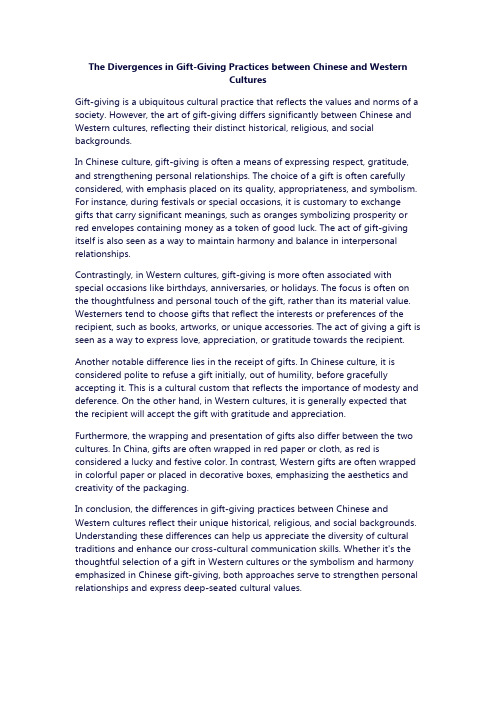
The Divergences in Gift-Giving Practices between Chinese and WesternCulturesGift-giving is a ubiquitous cultural practice that reflects the values and norms of a society. However, the art of gift-giving differs significantly between Chinese and Western cultures, reflecting their distinct historical, religious, and social backgrounds.In Chinese culture, gift-giving is often a means of expressing respect, gratitude, and strengthening personal relationships. The choice of a gift is often carefully considered, with emphasis placed on its quality, appropriateness, and symbolism. For instance, during festivals or special occasions, it is customary to exchange gifts that carry significant meanings, such as oranges symbolizing prosperity or red envelopes containing money as a token of good luck. The act of gift-giving itself is also seen as a way to maintain harmony and balance in interpersonal relationships.Contrastingly, in Western cultures, gift-giving is more often associated with special occasions like birthdays, anniversaries, or holidays. The focus is often on the thoughtfulness and personal touch of the gift, rather than its material value. Westerners tend to choose gifts that reflect the interests or preferences of the recipient, such as books, artworks, or unique accessories. The act of giving a gift is seen as a way to express love, appreciation, or gratitude towards the recipient. Another notable difference lies in the receipt of gifts. In Chinese culture, it is considered polite to refuse a gift initially, out of humility, before gracefully accepting it. This is a cultural custom that reflects the importance of modesty and deference. On the other hand, in Western cultures, it is generally expected that the recipient will accept the gift with gratitude and appreciation. Furthermore, the wrapping and presentation of gifts also differ between the two cultures. In China, gifts are often wrapped in red paper or cloth, as red is considered a lucky and festive color. In contrast, Western gifts are often wrapped in colorful paper or placed in decorative boxes, emphasizing the aesthetics and creativity of the packaging.In conclusion, the differences in gift-giving practices between Chinese and Western cultures reflect their unique historical, religious, and social backgrounds. Understanding these differences can help us appreciate the diversity of cultural traditions and enhance our cross-cultural communication skills. Whether it's the thoughtful selection of a gift in Western cultures or the symbolism and harmony emphasized in Chinese gift-giving, both approaches serve to strengthen personal relationships and express deep-seated cultural values.。
中西方送礼礼仪的差异有哪些_国外送礼的礼仪讲究
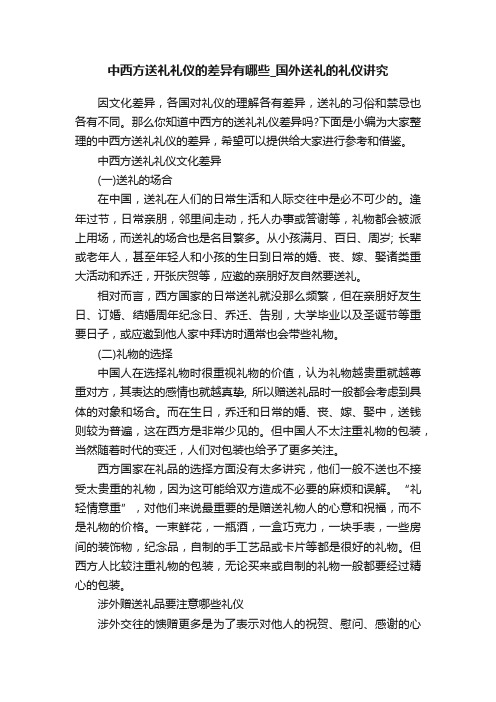
中西方送礼礼仪的差异有哪些_国外送礼的礼仪讲究因文化差异,各国对礼仪的理解各有差异,送礼的习俗和禁忌也各有不同。
那么你知道中西方的送礼礼仪差异吗?下面是小编为大家整理的中西方送礼礼仪的差异,希望可以提供给大家进行参考和借鉴。
中西方送礼礼仪文化差异(一)送礼的场合在中国,送礼在人们的日常生活和人际交往中是必不可少的。
逢年过节,日常亲朋,邻里间走动,托人办事或答谢等,礼物都会被派上用场,而送礼的场合也是名目繁多。
从小孩满月、百日、周岁; 长辈或老年人,甚至年轻人和小孩的生日到日常的婚、丧、嫁、娶诸类重大活动和乔迁,开张庆贺等,应邀的亲朋好友自然要送礼。
相对而言,西方国家的日常送礼就没那么频繁,但在亲朋好友生日、订婚、结婚周年纪念日、乔迁、告别,大学毕业以及圣诞节等重要日子,或应邀到他人家中拜访时通常也会带些礼物。
(二)礼物的选择中国人在选择礼物时很重视礼物的价值,认为礼物越贵重就越尊重对方,其表达的感情也就越真挚, 所以赠送礼品时一般都会考虑到具体的对象和场合。
而在生日,乔迁和日常的婚、丧、嫁、娶中,送钱则较为普遍,这在西方是非常少见的。
但中国人不太注重礼物的包装,当然随着时代的变迁,人们对包装也给予了更多关注。
西方国家在礼品的选择方面没有太多讲究,他们一般不送也不接受太贵重的礼物,因为这可能给双方造成不必要的麻烦和误解。
“礼轻情意重”,对他们来说最重要的是赠送礼物人的心意和祝福,而不是礼物的价格。
一束鲜花,一瓶酒,一盒巧克力,一块手表,一些房间的装饰物,纪念品,自制的手工艺品或卡片等都是很好的礼物。
但西方人比较注重礼物的包装,无论买来或自制的礼物一般都要经过精心的包装。
涉外赠送礼品要注意哪些礼仪涉外交往的馈赠更多是为了表示对他人的祝贺、慰问、感谢的心意,因此在选择礼品时应挑选具有一定纪念意义、民族特色,或具有某些艺术价值,或为受礼人所喜爱的纪念品、食品、花束、书……(1)选择礼物。
涉外交往的馈赠更多是为了表示对他人的祝贺、慰问、感谢的心意,因此在选择礼品时应挑选具有一定纪念意义、民族特色,或具有某些艺术价值,或为受礼人所喜爱的纪念品、食品、花束、书籍、画册、一般日用品等。
中西方送礼物和接受礼物的差异英语作文
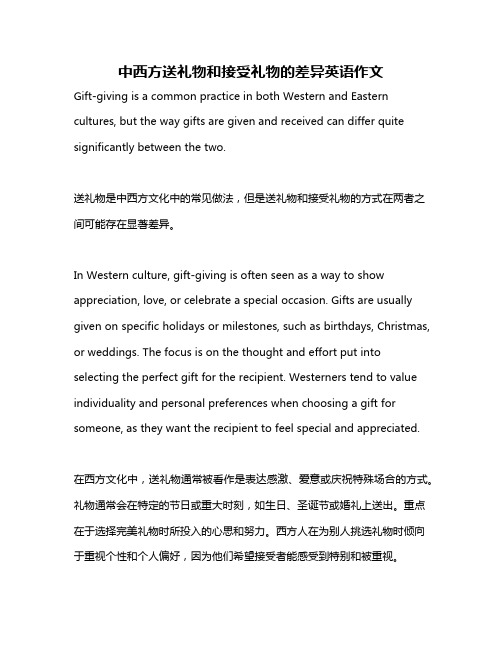
中西方送礼物和接受礼物的差异英语作文Gift-giving is a common practice in both Western and Eastern cultures, but the way gifts are given and received can differ quite significantly between the two.送礼物是中西方文化中的常见做法,但是送礼物和接受礼物的方式在两者之间可能存在显著差异。
In Western culture, gift-giving is often seen as a way to show appreciation, love, or celebrate a special occasion. Gifts are usually given on specific holidays or milestones, such as birthdays, Christmas, or weddings. The focus is on the thought and effort put into selecting the perfect gift for the recipient. Westerners tend to value individuality and personal preferences when choosing a gift for someone, as they want the recipient to feel special and appreciated.在西方文化中,送礼物通常被看作是表达感激、爱意或庆祝特殊场合的方式。
礼物通常会在特定的节日或重大时刻,如生日、圣诞节或婚礼上送出。
重点在于选择完美礼物时所投入的心思和努力。
西方人在为别人挑选礼物时倾向于重视个性和个人偏好,因为他们希望接受者能感受到特别和被重视。
中英送礼区别英文作文六句话
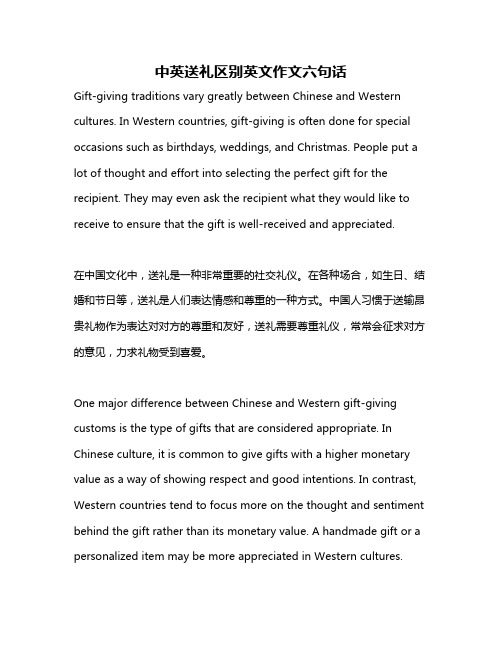
中英送礼区别英文作文六句话Gift-giving traditions vary greatly between Chinese and Western cultures. In Western countries, gift-giving is often done for special occasions such as birthdays, weddings, and Christmas. People put a lot of thought and effort into selecting the perfect gift for the recipient. They may even ask the recipient what they would like to receive to ensure that the gift is well-received and appreciated.在中国文化中,送礼是一种非常重要的社交礼仪。
在各种场合,如生日、结婚和节日等,送礼是人们表达情感和尊重的一种方式。
中国人习惯于送输昂贵礼物作为表达对对方的尊重和友好,送礼需要尊重礼仪,常常会征求对方的意见,力求礼物受到喜爱。
One major difference between Chinese and Western gift-giving customs is the type of gifts that are considered appropriate. In Chinese culture, it is common to give gifts with a higher monetary value as a way of showing respect and good intentions. In contrast, Western countries tend to focus more on the thought and sentiment behind the gift rather than its monetary value. A handmade gift or a personalized item may be more appreciated in Western cultures.中国和西方送礼风俗的另一个重大区别是被认为是合适的礼物类型。
中西方收礼物的差异英语作文
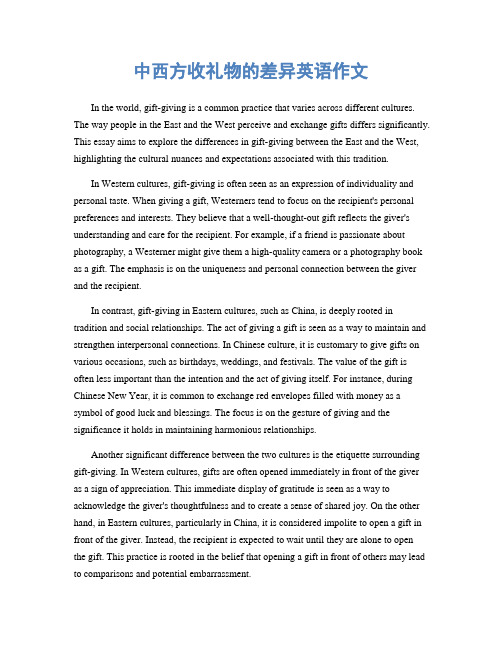
中西方收礼物的差异英语作文In the world, gift-giving is a common practice that varies across different cultures. The way people in the East and the West perceive and exchange gifts differs significantly. This essay aims to explore the differences in gift-giving between the East and the West, highlighting the cultural nuances and expectations associated with this tradition.In Western cultures, gift-giving is often seen as an expression of individuality and personal taste. When giving a gift, Westerners tend to focus on the recipient's personal preferences and interests. They believe that a well-thought-out gift reflects the giver's understanding and care for the recipient. For example, if a friend is passionate about photography, a Westerner might give them a high-quality camera or a photography book as a gift. The emphasis is on the uniqueness and personal connection between the giver and the recipient.In contrast, gift-giving in Eastern cultures, such as China, is deeply rooted in tradition and social relationships. The act of giving a gift is seen as a way to maintain and strengthen interpersonal connections. In Chinese culture, it is customary to give gifts on various occasions, such as birthdays, weddings, and festivals. The value of the gift is often less important than the intention and the act of giving itself. For instance, during Chinese New Year, it is common to exchange red envelopes filled with money as a symbol of good luck and blessings. The focus is on the gesture of giving and the significance it holds in maintaining harmonious relationships.Another significant difference between the two cultures is the etiquette surrounding gift-giving. In Western cultures, gifts are often opened immediately in front of the giver as a sign of appreciation. This immediate display of gratitude is seen as a way to acknowledge the giver's thoughtfulness and to create a sense of shared joy. On the other hand, in Eastern cultures, particularly in China, it is considered impolite to open a gift in front of the giver. Instead, the recipient is expected to wait until they are alone to open the gift. This practice is rooted in the belief that opening a gift in front of others may lead to comparisons and potential embarrassment.Furthermore, the value and symbolism attached to gifts differ between the East and the West. In Western cultures, expensive and luxurious gifts are often seen as a way to impress and show affection. The monetary value of the gift is considered a reflection of the giver's generosity and social status. In contrast, in Eastern cultures, practicality and usefulness are highly valued. Gifts that serve a practical purpose or have a symbolic meaning are preferred. For example, in Chinese culture, giving a set of kitchen utensils to a newlywed couple symbolizes a wish for a harmonious and prosperous marriage.In conclusion, the differences in gift-giving between the East and the West are deeply rooted in cultural values and traditions. While Western cultures emphasize individuality and personal connection, Eastern cultures prioritize social relationships and symbolic gestures. Understanding and respecting these cultural differences is essential to avoid misunderstandings and ensure meaningful exchanges of gifts. By embracing the diversity of gift-giving customs, we can foster stronger cross-cultural connections and appreciation for each other's traditions.。
